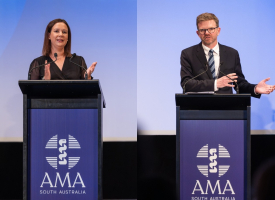AMA Guide to Informed Financial Consent 2024
Informed Financial Consent - a collaboration between doctors and patients.
Assisting patients to understand their health care and its costs.
Informed Financial Consent (IFC) works best when doctors, hospitals and health insurers work together to provide information to patients about the costs associated with treatment, and the private health insurance benefits payable, prior to admission to hospital.
The AMA encourages good IFC practice and the provision of information about medical fees to patients. Patients should always ask their doctor about their fees, and the fees of other doctors involved in their care, before going to hospital as a private patient.
The AMA has worked with a range of key medical organisations to create a comprehensive resource document that supports a collaboration between doctors and their patients.
This document, the AMA Guide to Informed Financial Consent 2024, supports patients to be more engaged in conversations with their doctors, with their health fund and with their choice of hospital. It assists in creating a dialogue that will improve transparency about treatment options, charges and expected out-of-pocket costs.
You can find a range of useful IFC information produced by the AMA on medical gaps and questions to ask your doctor below.
AMA policy
AMA Position Statement on Informed Financial Consent 2024
AMA Position Statement on Setting Medical Fees and Billing Practices 2024
AMA informed financial consent form template
Below is a template doctors can use to provide written IFC to patients. Doctors can download this form and make any changes necessary to provide information about their fees to patients.
Download the pro-forma "estimate of fees" PDF Template
Download the pro-forma "estimate of fees" Word Template
"let's talk about fees..." brochures, pads and posters
The AMA IFC brochure, flyer and poster are available to download free of charge to medical practices to distribute to patients. They outline questions patients should ask their doctor and private health insurer about the cost of their treatment and any out of pockets costs they might incur before going to hospital as a private patient. (Please note we no longer have printed copies of these brochures, pads or posters available).
What is a medical gap?
A medical gap (or out-of-pocket cost) is the difference between your doctor's fee and the combined amount of the Medicare rebate and the benefit your private health insurer will pay for a medical service. Government Medicare rebates have not kept pace with the increasing costs of delivering treatment.
The AMA has long campaigned for better indexation of Medicare schedule fees. Since 1999, we have included a fee gaps chart in the AMA Fees List to show the ever-widening gap between the indexation of Medicare schedule fees and the indices for CPI, average weekly earnings and AMA fees.
The AMA Gaps poster illustrates how successive Governments have failed to index the Medicare schedule fees in line with the CPI and average weekly earnings.
With year upon year of indexation that has been well below par, today there is now quite a disconnect between Medicare schedule fees and the realistic cost of providing the services.
The AMA encourages members to explain this to their patients. The poster is an easy way to show patients why they may have to pay a gap.
Doctors fees
The fees doctors charge patients for their professional medical services must cover their practice costs. Every private practising medical practitioner incurs a wide range of practice costs in order to provide a high quality services to patients.
The costs of running medical practices vary across the country, and across speciality groups. But every medical practice, be it a sole practitioner or a large corporate practice, incurs the cost of employing administrative and clinical practice staff, general running expenses such as computers, rent, electricity, professional indemnity insurance and in most cases the cost of medical equipment and supplies.
The practice costs must all be met entirely from the fee charged by the doctor for the medical services he/she provides to patients.
Questions to ask your doctor about costs before you go to hospital
- What are your fees?
- Are there any fees for other doctors?
- Will I have any out-of-pocket costs?
- Is your fee an estimate only?
- Can I have an estimate of your fees in writing?
- If the cost changes, when will you let me know?
- What if I need a prosthesis/implant?
- Should I contact my health fund?
Read more about the questions to ask your doctor
Remember: If you are unclear about the total costs of your treatment... Ask your doctor and your health fund.



